新概念第一册第85课现在完成时
(完整版)新概念英语第一册lesson85-86重点解析
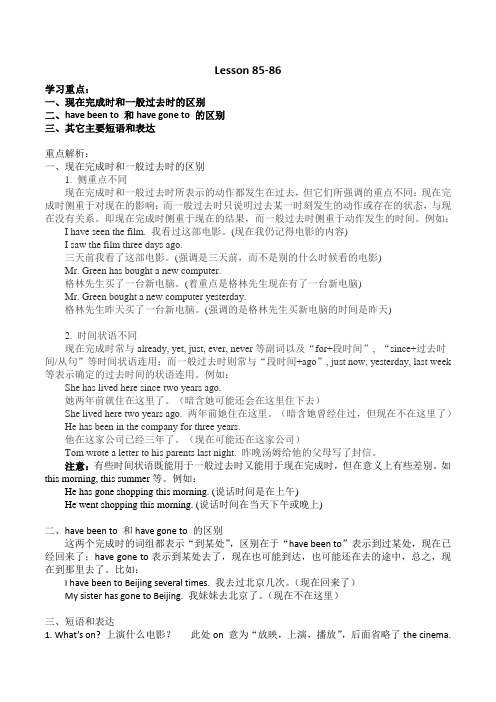
Lesson 85-86学习重点:一、现在完成时和一般过去时的区别二、have been to 和have gone to 的区别三、其它主要短语和表达重点解析:一、现在完成时和一般过去时的区别1. 侧重点不同现在完成时和一般过去时所表示的动作都发生在过去,但它们所强调的重点不同:现在完成时侧重于对现在的影响;而一般过去时只说明过去某一时刻发生的动作或存在的状态,与现在没有关系。
即现在完成时侧重于现在的结果,而一般过去时侧重于动作发生的时间。
例如:I have seen the film. 我看过这部电影。
(现在我仍记得电影的内容)I saw the film three days ago.三天前我看了这部电影。
(强调是三天前,而不是别的什么时候看的电影)Mr. Green has bought a new computer.格林先生买了一台新电脑。
(着重点是格林先生现在有了一台新电脑)Mr. Green bought a new computer yesterday.格林先生昨天买了一台新电脑。
(强调的是格林先生买新电脑的时间是昨天)2. 时间状语不同现在完成时常与already, yet, just, ever, never等副词以及“for+段时间”, “since+过去时间/从句”等时间状语连用;而一般过去时则常与“段时间+ago”, just now, yesterday, last week 等表示确定的过去时间的状语连用。
例如:She has lived here since two years ago.她两年前就住在这里了。
(暗含她可能还会在这里住下去)She lived here two years ago. 两年前她住在这里。
(暗含她曾经住过,但现在不在这里了)He has been in the company for three years.他在这家公司已经三年了。
(现在可能还在这家公司)Tom wrote a letter to his parents last night. 昨晚汤姆给他的父母写了封信。
新概念一册第85课
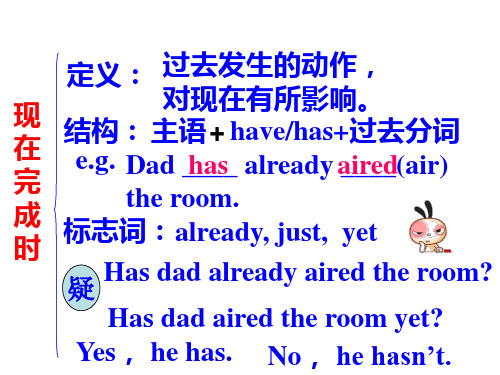
be的过去分词 see的过去分词 电影院 电影 巴黎 城市 美丽的
been seen
cinema film Paris city beautiful
Do you like movies?
What kind of movies do you like?The old one or the new one?
复习现在完成时
把下列句子变成疑问句和否定句 1、I have already had lunch. Have you had lunch yet?
I haven’t had lunch yet . 2、Tom has just left.
Has Tom just left?
Tom hasn’t just left.
homework
Hello,Ken. Hi,George.
Have you just been to the cinema?
Yes,I have.
Paris in the spring.
What's on?
I saw it on television Oh, I've last year.It's an old already seen film,but it's very good. it.
e.g. —Where is Tom? —He has gone to Shanghai.
Harbin
Dalian
Beijing
Lindian
用 been to/gone to填空
1. Where’s Jim? goneGuilin. He has _____to gone to Jim’s home, but he 2. Tom has_____ hasn’t come back. been to Hong Kong twice. 3. I have______ been 4. I have never ______to the beach in Sanya. gone to the library, so I 5. Tom has ______ have to wait for him..
新概念课堂笔记 第一册 Lesson 85-86
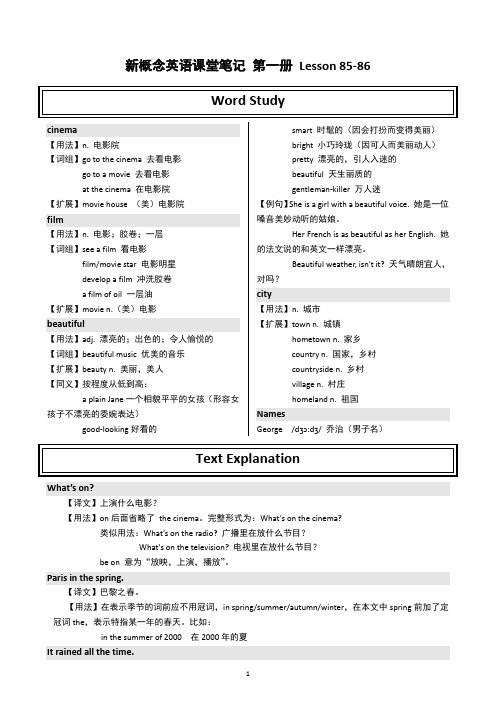
新概念英语课堂笔记第一册Lesson 85-86cinema【用法】n. 电影院【词组】go to the cinema 去看电影go to a movie 去看电影at the cinema 在电影院【扩展】movie house (美)电影院film【用法】n. 电影;胶卷;一层【词组】see a film 看电影film/movie star 电影明星develop a film 冲洗胶卷a film of oil 一层油【扩展】movie n.(美)电影beautiful【用法】adj. 漂亮的;出色的;令人愉悦的【词组】beautiful music 优美的音乐【扩展】beauty n. 美丽,美人【同义】按程度从低到高:a plain Jane一个相貌平平的女孩(形容女孩子不漂亮的委婉表达)good-looking好看的smart 时髦的(因会打扮而变得美丽)bright 小巧玲珑(因可人而美丽动人)pretty 漂亮的,引人入迷的beautiful 天生丽质的gentleman-killer 万人迷【例句】She is a girl with a beautiful voice. 她是一位嗓音美妙动听的姑娘。
Her French is as beautiful as her English. 她的法文说的和英文一样漂亮。
Beautiful weather, isn't it? 天气晴朗宜人,对吗?city【用法】n. 城市【扩展】town n. 城镇hometown n. 家乡country n. 国家,乡村countryside n. 乡村village n. 村庄homeland n. 祖国NamesGeorge /dʒɔ:dʒ/ 乔治(男子名)What’s on?【译文】上演什么电影?【用法】on后面省略了the cinema。
完整形式为:What’s on the cinema?类似用法:What’s on the radio? 广播里在放什么节目?What's on the television? 电视里在放什么节目?be on 意为“放映,上演,播放”。
新概念一Lesson85-86讲解与习题
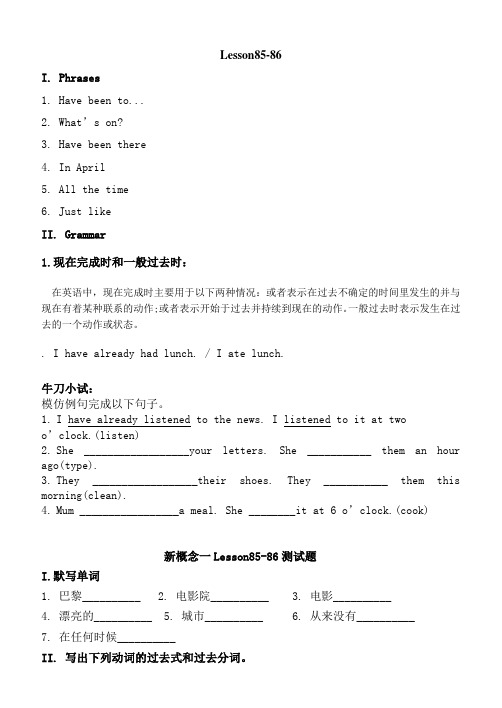
Lesson85-86I. Phrases1.Have been to...2.What’s on?3.Have been there4.In April5.All the time6.Just likeII. Grammar1.现在完成时和一般过去时:在英语中,现在完成时主要用于以下两种情况:或者表示在过去不确定的时间里发生的并与现在有着某种联系的动作;或者表示开始于过去并持续到现在的动作。
一般过去时表示发生在过去的一个动作或状态。
. I have already had lunch. / I ate lunch.牛刀小试:模仿例句完成以下句子。
1.I have already listened to the news. I listened to it at twoo’clock.(listen)2.She __________________your letters. She ___________ them an hour ago(type).3.They __________________their shoes. They ___________ them this morning(clean).4.Mum _________________a meal. She ________it at 6 o’clock.(cook)新概念一Lesson85-86测试题I.默写单词1. 巴黎__________2. 电影院__________3. 电影__________4. 漂亮的__________5. 城市__________6. 从来没有__________7. 在任何时候__________II. 写出下列动词的过去式和过去分词。
1.buy _________ _________2.do _________ _________3.have _________ _________4.see _________ _________5.open _________ _________6.air _________ _________7.ask_________ _________8.put_________ _________9.go_________ _________10.be_________ _________III. 按要求改写句子1.I have just been to the cinema. (改为一般疑问句并作肯定回答)has already had her lunch. (改为一般疑问句)3.She listened to the radio just now. (改为一般疑问句)4.His brother works in the factory. (就划线部分提问)______________________________________________________________________ 5.We are cleaning the room now. (改为否定句)____________________________________________________________________ 6.He has gone to Beijing. (改为否定句)_____________________________________________________________________ 7.He cleaned the room this morning. (改为一般疑问句)_____________________________________________________________________ 8.They have washed their hands. (改为否定句)_____________________________________________________________________ IV. 连词成句1.television, do, turn, not, on, the___________________________________________2.did, he, what, yesterday, do,afternoon___________________________________________3.been, the, never, I, to, cinema, have___________________________________________4.just, has, the, he, cupboard, dusted___________________________________________5.you, have, to, Shanghai, been, never___________________________________________V. 完成下列对话G: Hello, Tom.T: Hi, George.G: __________________________________________?(你刚去过电影院吗?)T: Yes, __________________________________________.(我刚去过)G: __________________________________________?(演的什么片子?)T: White Snake.G: I’ve already seen it.__________ on television __________. (去年在电视上看过的)KeysLesson 85-86I.省略II., bought, done, had, seen, opened, aired7. asked, asked, put, gonewere, beenIII. 1. Have you just been to the cinema? Yes, I have.2. Has she had her lunch yet?3. Did she listen to the radio just now?4. Where does his brother work?5. We are not cleaning the room now.6. He hasn’t gone to Beijing.7. Did he clean the room this morning?8. They haven’t washed their hands.IV. not turn on the television.2. What did he do yesterday afternoon?3. I have never been to the cinema.4. He has just dusted the cupboard.5. You have never been to Shanghai., after the mealV. 1. Have you just been to the cinema?2. I have.3. What’s on?4. I saw it on television last year.。
新概念英语第一册85-86课优秀课件

• 今天晚上电视上有什么节目?
• What’s on television tonight?
11/3/2020
8
• in spring/summer/autumn/winter 在季节前是 不用加定冠词的
• ‘Paris in the Spring’ • 指的是具体的一个春天在巴黎发生的事情,所
以加了定冠词。
11/3/2020
7
课文讲解
• Have you just been to the cinema?
• 现在完成时,表示去过某地而现在已经回 来了。
• 这里的just是“刚刚,刚才”的意思。
• What’s on?
• 这里的be on是“上演”的意思
• 有一个新电影正上演。
• A new film is now on.
• 她甚至比我预期的还要美。did a beautiful job of painting the desk. • 他油漆了书桌,活干得很漂亮。 • beauty n. 美景,美好的东西,美人. • beauty contest 选美
11/3/2020
意用法的区别: • never 通常用于陈述句中,表示“绝不、从
来没有”。 • ever 通常用于疑问句中,表示“曾经、在
任何时候”。
11/3/2020
10
• 我从来没去过西班牙。 • I have never been to Spain. • 你曾经去过西班牙吗? • Have you ever been to Spain? • It rained all the time. 一直、始终(同义句) = The rain never stopped. I have already read this book.(变疑问句 ) Have you read this book yet?
新概念英语85课解析
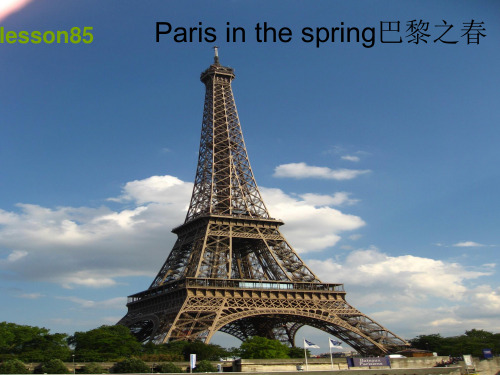
It’s an old film, but it’s good. 一般现在时(对这部电影的一般性评价)
on television: 表示从电视上看 到(指抽象概念, 不加冠词) eg:I saw her on television. 我在电视上看到 过她。
on the television: 指在电视机上(表 具体的方位,用冠 词。) eg:Where is my book?我的书在哪?
★beautiful adj. 漂亮的 ① adj. 美丽的,使生美感的
She is a beautiful girl.
nerver & ever
Never 决不, 从不
I will never forget your kindness. 我永远忘不了你的好意。
活到老,学到老。 One is never too old to learn.
拿破仑一世在欧斯代尔利茨战役中打 败了奥俄联军,凯旋回国.
Louvre/’luvə/ 卢浮宫
Notre dame cathedral 巴黎圣母院
单词学习
Paris cinema film beautiful city never ever
n. 巴黎 n. 电影院
n. 电影;胶卷 adj. 漂亮的
It's on the television.在电视 机上。
仿写句子:
我读过那本书。我昨天读的。它是本老书, 但是还是很有趣。
in spring/summer/autumn/winter 在季节 前是不用加定冠词的
‘Paris in the Spring’ 指的是具体的一个春天在巴黎发生的事情,
所以加了定冠词。
I’ve already seen it. 现在完成时(画外音:我知道那电影的内
新概念英语第一册Lesson85~90单词及语法解析
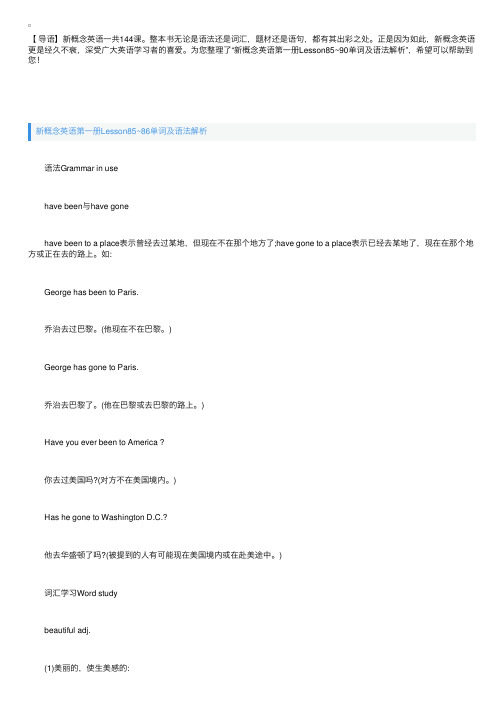
【导语】新概念英语⼀共144课。
整本书⽆论是语法还是词汇,题材还是语句,都有其出彩之处。
正是因为如此,新概念英语更是经久不衰,深受⼴⼤英语学习者的喜爱。
为您整理了“新概念英语第⼀册Lesson85~90单词及语法解析”,希望可以帮助到您!新概念英语第⼀册Lesson85~86单词及语法解析 语法Grammar in use have been与have gone have been to a place表⽰曾经去过某地,但现在不在那个地⽅了;have gone to a place表⽰已经去某地了,现在在那个地⽅或正在去的路上。
如: George has been to Paris. 乔治去过巴黎。
(他现在不在巴黎。
) George has gone to Paris. 乔治去巴黎了。
(他在巴黎或去巴黎的路上。
) Have you ever been to America ? 你去过美国吗?(对⽅不在美国境内。
) Has he gone to Washington D.C.? 他去华盛顿了吗?(被提到的⼈有可能现在美国境内或在赴美途中。
) 词汇学习Word study beautiful adj. (1)美丽的,使⽣美感的: She was even more beautiful than I had expected. 她甚⾄⽐我预期的还要美。
She’s a girl with a beautiful voice. 她是⼀位嗓⾳美妙动听的姑娘。
(2)出⾊的,完美的;令⼈愉悦的: Her French is as beautiful as her English。
她的法⽂说得和英⽂⼀样漂亮。
He did a beautiful job of painting the desk. 他油漆了书桌,活⼲得很漂亮。
Beautiful weather,isn’t it? 天⽓晴朗宜⼈,对吗?新概念英语第⼀册Lesson87~88单词及语法解析 语法 Grammar in use 现在完成时的疑问式及否定式 现在完成时的构成是 have/has+ 过去分词,因此其疑问式是将have/has提到主语之前,否定式则在have/has后加上not即可如: Have they lived here for 10 years ? 他们在这⼉住了10年了吗? No,they haven’t lived here for 10 years 没有,他们在这⼉没有住了10年。
新概念英语第一册85_86课件

Revision
现在完成时
构成: S(主语) + have/ has+ 动词过去分词 注意:这里的have是助动词,无意义 have-had-had
现在完成时的时间状语(特征词) • already 已经 yet 还 • ever 曾经 never从不 just刚刚 • for+一段时间 • since+时间点 since 2006 • since +时间段+ago
eg:I‘m just making tea for you. 我正要为你沏茶。
2. I've already seen it.
already:已经
eg:I have
already read this book.我 已经读过这本
seen是see 的过去分词
书了。
it:代词
代指“Paris of the spring” 这部电影
since two years ago
2019/8/2
规则动词过去分词和过去式变法一样
1. + ed
clean --- cleaned
2. + d
arrive --- arrived
3. 辅音字母+y结尾的 把y 变i + ed empty --- emptied
• New words
Paris 巴黎(法国首都)
What is the largest city in China? 中国最大的城市什么?
Shanghai is the largest city in China. 上海是中国最大的城市。
city life 都市生活 country life 田园生活或乡村生活
新概念英语第一册85课课件演示教学
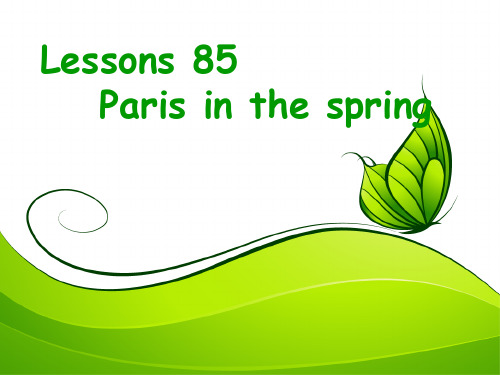
(A )5.A: Did you read the book last night?
B:No, I____it three times.
A. have read B. was reading C. have readed D. readed
I. Revision:
Now let's do some exercises:
否定式: 主语 + haven't/hasn't + 过去分词 + 其他。 疑问式: Have /Has + 主语 + 过去分词 + 其他? 简略答语: Yes, 主语 + have/has.(肯定)
No, 主语 + haven't/hasn't.(否定)
(3)一般现在完成时通常与表示不确定的时间副词或短语连用 如 just, already, before, never, ever, twice, three times 等。 (4)现在完成时在汉语中常用“了”、“过”或“已经”来表示。
II. Complete the sentences with the words given in the correct form.
1. This is the first time I have__b_e_e_n_(be) in Australia.
2. My brother__is__w_r_it_in_g__(write) a letter at the moment.
SAM: Aren't you lucky! TOM: When are you going to have a holiday, Sam? SAM: I don't know.
【原创】新概念英语第一册 Lesson 85 笔记

Paris n. 巴黎the capital of France(各国首都)cinema n. 电影院go to the cinemago to school 上学go to the school 去学校tthe是指定的意思in hospital 住院in the hospital 在医院里go to church (去教堂)做礼拜film n. 电影/moviesee a film / go to the cinema 看电影make a film 拍电影警匪\犯罪片crime Film 、剧情片feature /story film 灾难片disaster film、动作片action movie、冒险片adventure movie 恐怖\惊悚片horror film 、爱情片affectional /love story filmfilm、喜剧片comedy film、西部片western films 和音乐歌舞片musical film 战争片war movie/ film、科幻片science fiction film、动画片cartoon、家庭片Family Film、武侠片swordsmen film、文艺片literary film、悬疑片suspense film、历史片Historical Film、传记片biographical film 体育片sports [athletic] film、记录片documentary filmbeautiful adj. 漂亮的(1)美丽的,使生美感的:She was even more beautiful than I had expected. 她甚至比我预期的还要美。
She's a girl with a beautiful voice. 她是一位嗓音美妙动听的姑娘(2)出色的,完美的;令人愉悦的:Her French is as beautiful as her English. 她的法文说得和英文一样漂亮。
新概念第一册第85课现在完成时

一般现在时(对这部电影的一般性评价)
16
仿照例句: 我已经读了这本书。我是在昨天读的。这是本旧 书,但是很有趣。
I have already read this book.
I read it yesterday.
It’s an old book, but it’s interesting.
17
1
含规则动词的现在完成时句型
句型: I have been to… I have gone to… 副词: ever, never
contents
2
复习
步骤
课文讲解
课堂练习
3
我已经吃过午饭了. I’ve already had lunch. 他们今年已经度假了. They’ve already had holiday this year. 她已经吃过牛肉了. She has already had beef.
6
Paris Cinema Film Movie Beautiful Beauty n.
7
City Never Ever Just already
8
★ 回顾现在完成时:
主语+have/ has + 动词的过去分词
表示过去的动作对现在的影响
I have had breakfast.
影响.
already, just ( 肯定句中); never(表否 定); ever(疑问句和 否定句中)
Have you just been to the cinema?
你刚去过电影院吗? I’ve already seen the film.
我已经看过那部电影了。
新概念第一册Lesson85-86

现在完成时VS一般过去时
The Eiffel Tower(埃菲尔铁塔),
The Eiffel Tower(埃菲尔铁 塔), which is 320 meters high, is the symbol of Paris. It was completed in 1889.
(2) 现在完成时由 主语+have/has+ 过去分词, 单数第3人称用has,其他人称皆用have。 规则动词的过去分词与过去式相同,而不规 则
动词的过去分词则需特别加以记忆。
动词的过去分词的规则变化规则:
• ①原形+ed 如:worked, passed • ②词尾是e时,直接加d 如:liked lived • ③若词尾为“辅音字母加y”,则改y为i加ed。
(movie theater<美语>电影院) • go to the cinema(英) • go to the theater(美)
去看电影
★ film [fɪlm] n. 电影;胶卷
(1)n. 电影
film 艺术影片 movie 好莱坞商 业片
a film star 电影明星 see the film 看电影
(4)already & yet
1.already “已经”,用于肯定、疑问句; 2.yet 用于疑问、否定句的句尾,含有“仍然” “还没有”之意。 Have you done it already?
Yes, I have already done it. Haven’t you done it yet?
320米高的埃费尔 铁塔是巴黎的标志。 它建于1889年. 埃菲 尔铁塔是巴黎的标志 之一,被法国人爱称 为“铁娘子”。它和 纽约的帝国大厦、东 京的电视塔同被誉为 西方三大著名建筑。
新概念英语第一册85-86课ppt课件

发生的事) • It’s an old film, but it’s good. • 一般现在时(对这部电影的一般性评价)
has already been to nearly every country in the world.
7
课文讲解
• Have you just been to the cinema? • 现在完成时,表示去过某地而现在已经回
来了。
• 这里的just是“刚刚,刚才”的意思。
• What’s on? • 这里的be on是“上演”的意思 • 有一个新电影正上演。
14
• Hello , Ken.
• Hi , George.
• Have you ____ ___ ___the cinema?
• Yes , ___ __.
• What ‘s _____?
• ‘Paris in the Spring’.
• Oh , I’ve ____ ____it . I ___ ___ ___ ___last year . It’s an ___ ___, but it’s ___ ___.
9
• 仿写句子: • 我读过那本书。 I have read this book. • 我昨天读的。 I read it yesterday. • 它是本老书,但是还是很有趣。 • It’s old, but it’s very interesting. • never和ever都是完成时的标志词,但要注
新概念英语1Lesson85
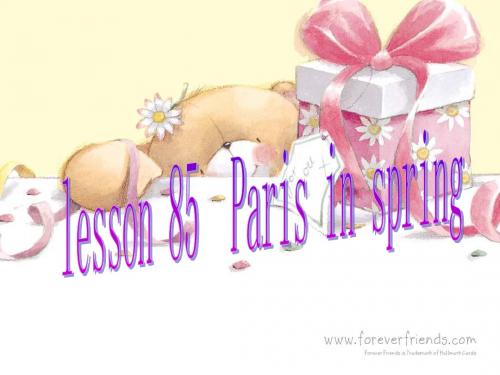
have/has been to 去过已回 have/has gone to 去了未回
GEORGE: What's on? ———— KEN: 'Paris in the spring'. GEORGE: Oh, I've already seen it. I saw it on television last year. be on 是上演的意思, It's an old film, 是上演的意思, 也可理解成在荧幕上 but it's very good.
At what time of year did Ken visit Paris?
GEORGE: Hello, Ken. just刚刚,刚才 刚刚, 刚刚 KEN: Hi, George. GEORGE: Have you just been to the cinema? KEN: Yes, I have.
现在完成时 在英语中, (1)在英语中,现在完成时表示过去发 生的事情对现在的影响。 生的事情对现在的影响。 构成: 过去分词, (2)构成:have/has+ 过去分词,单 第三人称用 其他人称皆用 数第三人称用has,其他人称皆用have。 (3)一般现在完成时通常与表示不确定 的时间副词或短语连用如 just, already,
GEORGE: Pairs in the spring, eh? KEN: It was spring, but the weather was awful. It rained all the time. GEORGE: Just like London!
all the time 一直, 一直,始终 just是就,正好, 是就,正好, 是就 恰恰的意思。 恰恰的意思。 like是像的意思 是像的意思 awful糟糕的, 糟糕的, 糟糕的 讨人厌的
新概念一lesson85

埃菲尔铁塔 (Eiffel Tower)
巴黎圣母院 ( Notre Dame Cathedral)
卢浮宫 (Louvre)
世界四大国际级都市:
法国:巴黎 Paris 美国:纽约 New York 英国:伦敦 London
日本:东京 Tokyo
cinema n.电影院 film n.电影 film & movie
----------friends----------Talking about Paris
George Ken
Paris is a beautiful city.
I've never been there. Have you ever been there, Ken? Yes, I have. I was there in April. Pairs in the spring, eh? It was spring, but the weather was awful. It rained all the time. Just like London!
What’s on?演什么(电影)呢?
•这里的be on是“上演”的意思 有一个新电影正上演。
A new film is now on.
spring/summer/autumn/winter 在季节前是不用加定冠词的 ‘Paris in the Spring’ 指的是具体的一个春天在巴黎发 生的事情,所以加了定冠词。
city n.城市
a large city 大都市 city hunter 城市猎人 city life 城市生活 country life 田园生活
never adv.决不,永不
我从未做过那个。 I have never done that before.
- 1、下载文档前请自行甄别文档内容的完整性,平台不提供额外的编辑、内容补充、找答案等附加服务。
- 2、"仅部分预览"的文档,不可在线预览部分如存在完整性等问题,可反馈申请退款(可完整预览的文档不适用该条件!)。
- 3、如文档侵犯您的权益,请联系客服反馈,我们会尽快为您处理(人工客服工作时间:9:00-18:30)。
6
Paris Cinema Film Movie Beautiful Beauty n.
7
City Never Ever Just already
8
★ 回顾现在完成时:
➢主语+have/ has + 动词的过去分词 ➢表示过去的动作对现在的影响 ➢I have had breakfast. ➢He has had a haircut.
➢ A new film is now on. ➢ 有一个新电影正在上演. ➢ What’s on TV tonight? ➢ 今晚电视里上演什么?
15
5. I’ve already seen it. 现在完成时
我已经看过了。
I saw it on television last year. 我是去年在电视上看的。
现在完成 过去发生的 have/has+
时
事对现在的 过去分词
影响.
already, just ( 肯定句中); never(表否 定);
ever(疑问句和 否定句中)
I was there last month.
I went to Paris last year.
I have already been to Paris.
1
含规则动词的现在完成时句型
contents
句型: I have been to… I have gone to…
副词: ever, never
2
步骤
复习 课文讲解
课堂练习
3
我已经吃过午饭了. I’ve already had lunch. 他们今年已经度假了. They’ve already had holiday this year. 她已经吃过牛肉了. She has already had beef.
17
6. Just like London! 这里的just是“正好、恰恰”的意思。 这里的like是“像”的意思。
• 学校就像家一样。 The school is just like home.
• 她就像妈妈一样。 She is just like mother.
18
时态 用法
动词形式
一般现在 一般,经 am/is /are;
9
➢回顾现在完成时: ➢Have you had dinner? ➢I haven’t had dinner. ➢I have already had dinner. ➢I haven’t had dinner yet.
10
1. ★ have been to…
去过…了 (去过某地,并且已经回来了) ➢ Have you been to Beijing? ➢你去过北京吗? ➢Have you been to the U.S.A.? ➢I have been to the U.K. ➢He has been to Canada.
I have just been there.
I have never been there.
19
Have you just been to the cinema? 你刚去过电影院吗?
I’ve already seen the film. 我已经看过那部电影了。
I saw it on TV last year. 我是去年在电视上看的。
26
他刚刚把书架油 漆好. 他昨天油漆的书 架.
He has just painted the bookcase. He painted the bookcase yesterday.
27
他们刚刚将手提箱打 包好. 他们昨天下午打包的 手提箱.
They’ve just packed the suitcase. They packed the suitcase yesterday afternoon.
20
I’ve never been to Paris. 我从来没有去过巴黎. Have you ever been to Paris? 你曾去过巴黎吗?
I was in Paris in April. 我4月份的时候在巴黎。
21
What have you done? I have just aired the room. I aired the room an hour ago.
一般过去时(强调在过去的某个具体的时间发生的事)
It’s an old film, but it’s good. 这是部老片子,但很好。
一般现在时(对这部电影的一般性评价)
16
仿照例句: 我已经读了这本书。我是在昨天读的。这是本旧 书,但是很有趣。
➢I have already read this book. ➢I read it yesterday. ➢It’s an old book, but it’s interesting.
22
我刚刚清洁了地 板. 我是两小时前清 洁的地板.
➢ I’ve just cleaned the floor. ➢I cleaned the floor two hours ago.
23
我刚刚去过巴黎. 我上周去的巴黎.
I’ve just been to Paris. I went to Paris last week.
时
常
do/ does
时间状语标志 词
例句
every day, always, usually, often,
sometimes,
I often read books.
He likes music.
一般过去 过去发生的 过去式
yesterday,
时
事
was/were, last---,
did
---ago
24
我刚刚打开电 视. 我半小时前打 开的电视.
I’ve just turned on the TV. I turned on the TV half an hour ago.
25
她刚刚洗了衣服. 她三小时前洗的衣服.
She has just washed the clothes. She washed the clothes three hours ago.
4
他已经理过发了. He has already had a haircut. 他们已经喝过茶了. They have already had tea. 她已经喝了酒了. She has already had wine.
5
Listen to the tape and answer the question: at what time of year did Ken visit Paris?
32
daily expression
现在完成时的规则动词
句型: have been to… have gone to…
they are…
副词: ever, never
33
34
28
ther has just walked along the river. Father walked along the river an hour ago.
29
她刚刚听完音乐. 她20分钟前听音乐了.
She has just listened to the music. She listened to the music twenty minutes ago.
I have never been to Paris.
I have never met him before.
ever adv. 曾经 (1)用于疑问句 Have you ever been
to Paris? (2)用于否定句 I haven`t ever been
abroad.(出国)
14
4. what’s on? 这里的is on是”上演”的意思
11
1. ★某人have gone to…
某人去…了(去某地,没有回来) ➢ He has gone to Beijing. ➢他去北京了.(还没回来) ➢Father has gone to Japan. ➢My brother has gone to Sichuang.
12
2. just 刚刚(一般与现在完成时连用)
➢ Have you just been to the cinema? ➢你刚刚去过电影院吗? ➢我刚刚去过学校. ➢I have just been to school. ➢我刚刚去过办公室. ➢I have just been to office.
13
3. ★ ever, never
never 决不, 从不
30
妈妈刚刚做好饭. 妈妈一小时前做的饭.
Mom has just cooked a meal. Mom cooked a meal an hour ago.
31
她刚刚热好牛奶.(boil) 她三分钟前热的牛 奶.(minute)
She has just boiled the milk. She boiled the milk three minutes ago.
